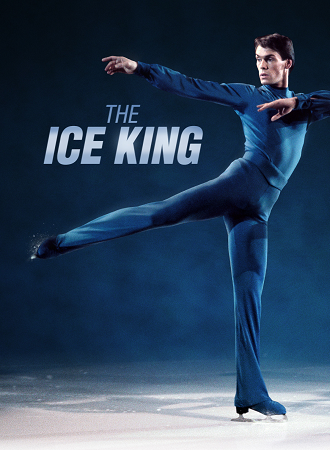
Ice King 2018
Distributed by Film Movement
Produced by James Erskine and Victoria Gregory
Directed by James Erskine
Streaming Media, 89 mins
College - General Adult
Homosexuality; Olympics; Sports
Date Entered: 12/09/2019
Reviewed by Ciara Healy, Librarian for Psychology and Neuroscience, Duke University"The life of a competitive figure skater is that of a monk... You live, breathe and die alone" - John Curry
"I wanted to be a dancer; I was allowed to skate. Because it was a sport, they thought it was OK." - John Curry
Curry combined the beauty of dance with the athleticism of skating and his talent came at a personal cost. Born in 1956 in Birmingham, John's early ambition was to take ballet lessons and his father forbid it. Even after beginning as a skater, he considered it "dancing on ice".
His father was consistently disapproving, and his solace was ice skating alone. As he became a young man, his physicality was reined in; it was suggested that he look less graceful and do fewer spirals. His overriding ambition was to bring theatricality and dance to ice skating, and he spent his early career between the UK and New York City.
Interspersed with archival footage of anti-homosexual propaganda and scare tactics, it is made clear in the first 10 minutes of the film that Curry's gender expression and skating style were indicative of homosexuality, despite ice skating being a sport.
Much of the film is told from many perspectives, from his first lover, Heinz Wirz, to many of the skaters in his skating company, and his family members as well as news reports and archival footage of his Olympic and theatrical performances on ice.
Curry's father committed suicide and while it was difficult for him to come to terms with, it was also a kind of liberation for John. He was active in the London gay scene. In 1970, while training in Switzerland his coach characterized his skating as "too soft" and stated "You will skate like a man." The only way to validate his style and form was to win the Olympics.
In Colorado in 1974 Curry was very happy to train in Colorado, under the patronage of his sponsor, the wealthy Ed Mosler. Curry was able to focus his entire attention on training, to get better coaching, and equipment to train off skates. The coach, Fassi, focused on Curry's figures, form and mental training with EST. He conquered his performance anxieties and engaged in visualizations.
He won the silver medal the 1975 European Championships. In the 1976 European championships, Eastern Bloc judges outnumbered the Western judges and in a heightened political atmosphere, the Czechoslovakian judge broke with the Bloc and scored John highly. He won the gold medal and captained the 1976 UK Olympic Men's team. His program and form were beautiful, and he was appreciated for his artistry. John won the Olympic gold medal that year with a balance between artistry and athleticism.
His gold medal receded in importance in the media given that his sexuality was moving to the fore as an aspect of his skating and his career. He was somewhat naive in thinking that coming out to a journalist was "off the record" assuming it would not be printed. He did not intentionally come out. None the less, it was published and newsworthy in Olympic sports coverage that year. Surprisingly, a wave of British support attended his outing by the media. He was given the Sports Personality of the Year and was the guest of honor at the Awards for Valor in Sports. Even his mother was kind and understanding about his homosexuality.
After his Olympic win, Curry and some of his fellow skaters formed a dance company - a ballet on ice - that performed in theaters as a "skating company" similar to a dance company, called a Theatre of Skating. His vision of a skating company was very theatrical, balletic and well-choreographed. Finally, he combined his dance and his skating prowess in an artistic, choreographed and fully expressive way. In 1978, Curry moved to NYC to go on tour with his company. New York performances were well received, and he was a hit on the NY gay social scene. However, his company faltered financially, and he became lonely and depressed. Among his company, he was viewed as rigorous, cutting, and demanding. Members of his company, particularly during a performance in Japan, noted Curry's misery and seeming depression. Curry admitted to having demons, despair, melancholy.
Curry's Symphony on Ice premiered at London's Albert Hall. The company was in debt again in 1984 despite performing at the Met in NYC. With that opening performance, he achieved what he set out to achieve on ice – and the audience was astonished and appreciative. After that performance, he was crying and wanted to quit the company; he was in debt again and faltering. He no longer wanted to perform, his body was wrecked and "the spirit had gone," according to the show’s producer Elva Corrie. The last performance for the company was in Denmark in 1984.
In 1984 Curry returned to the UK broke and confided to Heinz Wirz that he was HIV positive. In 1990 he skated again, for the last time, for an event called the Next Ice Age. As a skater, he finished his career on a high note, as his performance was about happiness, friendship and joy.